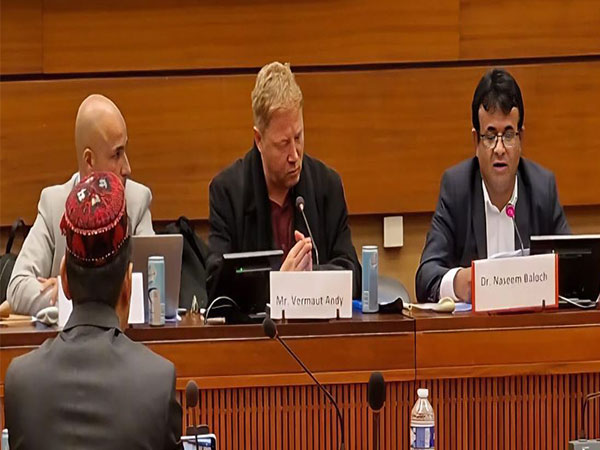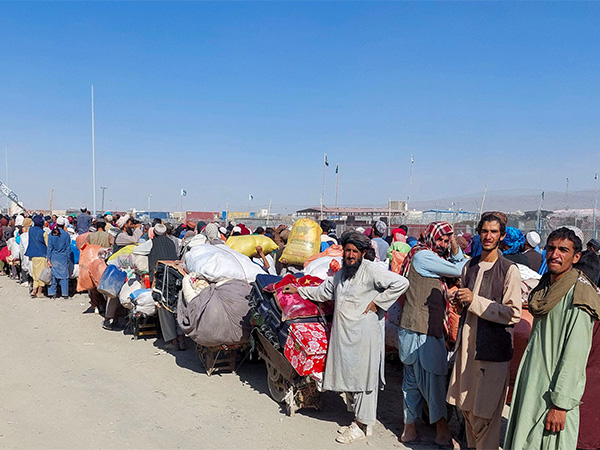Geneva [Switzerland], October 11 (ANI): During a side event at the ongoing 57th session of the United Nations Human Rights Council, Dr Naseem Baloch, chairman of the Baloch National Movement (BNM), criticised China’s growing influence in Balochistan.
The event was organized by the Tumuku Development Cultural Union (ECOSOC) and chaired by Fazal Ur Rehman Afridi, Principal Representative of the Union and Head of the Pashtun Tahafuz Movement (PTM) Europe Committee on International Advocacy & Foreign Affairs.
Dr Baloch highlighted the dangers of China’s partnership with Pakistan through the China-Pakistan Economic Corridor (CPEC), stating, “China seeks not only economic dominance but also control over a vital maritime route.” He emphasized that Gwadar, a focal point of CPEC, suffers from severe infrastructure deficiencies, with basic necessities like clean drinking water and reliable electricity remaining elusive amid scorching temperatures.
Stressing the strategic importance of Gwadar, located near the Strait of Hormuz, he noted that the ongoing fencing of Gwadar is not merely about controlling the Baloch people; it reflects China’s ambitions to secure influence over a region critical to global power dynamics.
Dr Baloch underscored the human rights violations resulting from China’s involvement in Balochistan, pointing out that CPEC, often portrayed as a development initiative, has exacerbated the exploitation of the region’s rich resources, including gas, gold, and copper while displacing entire villages for projects like the Gwadar port.
This crisis has persisted for over twenty years, affecting students, activists, journalists, and politicians.
The turmoil is compounded by severe distress among families, particularly women and the elderly, who suffer greatly over the fate of their missing relatives. “CPEC does not promise prosperity for the Baloch; instead, it is another mechanism of marginalization and dispossession,” he added.
The militarization of Gwadar, a city of deep cultural significance to the Baloch, was also a focal point of Dr Baloch’s speech. He lamented that residents are now unable to access their own city without military approval, as the area transforms into a militarized zone under China’s broader geopolitical ambitions.
As a survivor of enforced disappearance, Dr Baloch spoke about the dire human rights situation in Balochistan. He recounted his own experience and highlighted the systematic policy of enforced disappearances employed by Pakistan to silence Baloch’s aspirations for freedom.
He described Pakistan’s ongoing campaign of terror, including extrajudicial killings and torture, which has plagued the Baloch people since the forced annexation of Balochistan in 1948.
Addressing the broader issue of human rights violations in Pakistan, Dr Baloch mentioned the thousands of Baloch, Pashtun, Sindhi, and Kashmiri individuals held in internment centres without trial. He condemned these centres as “black holes of injustice,” where detainees endure horrific torture, with many never seen again.
In his concluding remarks, he stated, “The ongoing human rights abuses in Balochistan demand urgent international attention. Pakistan must be held accountable for its actions,” calling for an independent investigation into human rights violations and the imposition of sanctions on Pakistan for its persistent abuses.
“This is a fight for our very survival,” he added, urging the world to stand in solidarity with the Baloch people in their struggle for self-determination and freedom. (ANI)
Disclaimer: This story is auto-generated from a syndicated feed of ANI; only the image & headline may have been reworked by News Services Division of World News Network Inc Ltd and Palghar News and Pune News and World News
HINDI, MARATHI, GUJARATI, TAMIL, TELUGU, BENGALI, KANNADA, ORIYA, PUNJABI, URDU, MALAYALAM
For more details and packages















